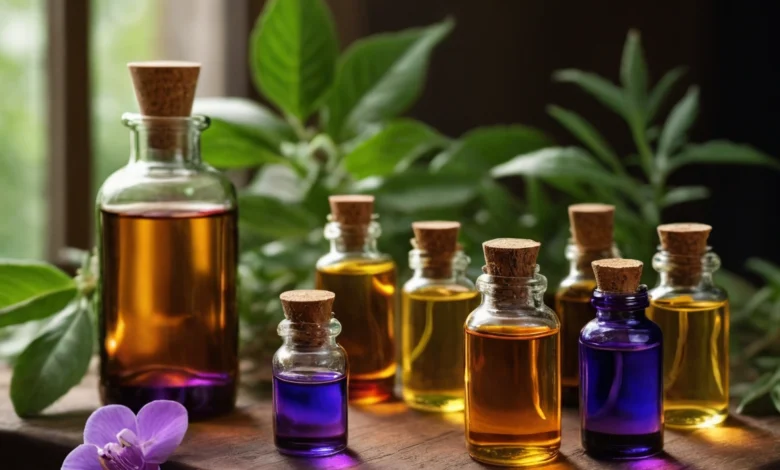How to Use Essential Oils for Fast Natural Healing: A Beginner’s Guide to Quick Relief

Essential oils have been used for centuries to support natural healing and wellness. With their potent anti-inflammatory, antiviral, and relaxation-promoting properties, essential oils can help alleviate various ailments, from headaches and muscle pain to anxiety and respiratory issues. This guide will introduce you to some of the best essential oils for fast, natural healing and explain how to use them effectively. If you’re looking to treat common health issues with an easy, natural approach, essential oils may be just what you need.
Key Essential Oils for Natural Healing and Their Benefits
1. Lavender Oil for Stress Relief and Sleep Aid
Lavender is known for its calming properties, making it ideal for stress relief and improved sleep. Its natural sedative effects help reduce anxiety, lower blood pressure, and promote relaxation. Lavender oil can also help alleviate mild headaches.
How to Use: Add a few drops to a diffuser or apply a diluted mix to your temples or wrists. You can also add it to a warm bath for a calming soak before bedtime.
2. Peppermint Oil for Pain Relief and Sinus Congestion
Peppermint oil is a powerhouse for treating headaches, migraines, and sinus congestion. Its active ingredient, menthol, provides a cooling effect that relieves tension and helps open airways. Peppermint oil is also beneficial for soothing sore muscles.
How to Use: Mix a few drops with a carrier oil, such as coconut or almond oil, and apply it to your temples, neck, or chest. Inhale directly from the bottle to clear sinuses or add to a diffuser to enjoy its benefits throughout a room.
3. Tea Tree Oil for Skin Infections and Respiratory Health
Tea tree oil is known for its powerful antimicrobial and anti-inflammatory properties. It’s particularly effective in treating skin infections, such as acne, cuts, or fungal infections. Tea tree oil can also be used to relieve congestion and respiratory issues.
How to Use: For skin issues, dilute tea tree oil with a carrier oil and apply directly to the affected area. For respiratory relief, add a few drops to hot water, cover your head with a towel, and inhale the steam for a few minutes.
4. Eucalyptus Oil for Cough and Cold Relief
Eucalyptus oil is excellent for relieving cough, congestion, and sinus infections. Its menthol-like properties help clear nasal passages and reduce inflammation in the airways, making it a go-to remedy for colds and respiratory infections.
How to Use: Add a few drops to a diffuser or inhale directly from the bottle to relieve sinus pressure. You can also mix eucalyptus oil with a carrier oil and apply it to the chest and neck to open airways and soothe coughs.
5. Frankincense Oil for Immune Support and Wound Healing
Frankincense has long been valued for its immune-boosting and healing properties. This oil is known to promote healthy cell regeneration, making it effective for wound healing and reducing scars. Additionally, frankincense can help alleviate stress and enhance meditation practices.
How to Use: Apply a few drops diluted with a carrier oil to cuts or scrapes for faster healing. You can also add it to your skincare routine or use it in a diffuser for relaxation and immune support.
6. Chamomile Oil for Stomach Pain and Anxiety
Chamomile is renowned for its soothing effects, which can relieve stomach cramps, bloating, and mild gastrointestinal issues. Chamomile also works well to calm nerves and promote restful sleep, making it effective for treating insomnia.
How to Use: Massage diluted chamomile oil onto your abdomen to ease stomach pain, or add a few drops to a diffuser or warm bath to relieve anxiety and promote sleep.
7. Rosemary Oil for Headaches and Mental Clarity
Rosemary oil has stimulating properties that make it excellent for boosting mental clarity, focus, and concentration. It can also relieve tension headaches and reduce joint and muscle pain.
How to Use: Inhale rosemary oil from a diffuser during study sessions or work. For headache relief, apply a diluted mix to your temples or the back of your neck.
How to Use Essential Oils Safely
While essential oils can be powerful allies for natural healing, they must be used with caution. Here are some important safety tips:
- Always Dilute Essential Oils: Essential oils are highly concentrated and can cause skin irritation if applied directly. Use a carrier oil (like coconut, almond, or olive oil) for dilution. A typical ratio is 3-5 drops of essential oil per tablespoon of carrier oil.
- Perform a Patch Test: Before applying any essential oil mixture to a large area of skin, do a small patch test on your inner arm to check for sensitivity or reactions.
- Avoid Sensitive Areas: Do not apply essential oils near the eyes, inside the ears, or on broken skin.
- Consult a Health Professional if Needed: If you are pregnant, nursing, or have a chronic health condition, consult a healthcare provider before using essential oils.
Frequently Asked Questions about Essential Oils for Healing
1. Can essential oils replace medications?
No, essential oils should not be used as a replacement for prescribed medications. They can complement traditional treatments but should not be seen as a primary form of treatment for serious health conditions.
2. How often can I use essential oils?
The frequency of use depends on the oil and the condition being treated. Generally, inhaling essential oils can be done several times a day, while topical applications should be limited to once or twice daily to avoid skin irritation.
3. Can essential oils be ingested?
Only under the guidance of a trained healthcare provider. Ingesting essential oils can be dangerous due to their potency and concentration.
4. What’s the best way to store essential oils?
Essential oils should be kept in dark glass bottles, stored in a cool, dry place away from sunlight to maintain their potency and shelf life.
5. Do essential oils expire?
Yes, essential oils can lose their effectiveness over time. Most oils have a shelf life of about 1-2 years, but oils like citrus may expire sooner due to oxidation.
Conclusion
Essential oils offer a fast, natural way to address common health concerns, from colds and headaches to skin issues and anxiety. Whether you’re looking to relieve pain, boost your immune system, or simply unwind, essential oils can be an excellent addition to your wellness toolkit. With safe and proper usage, these oils can enhance your quality of life and offer natural relief when you need it most.





